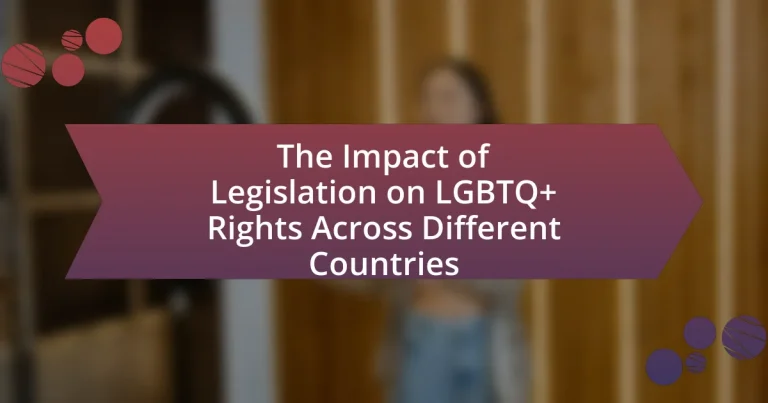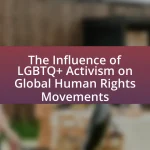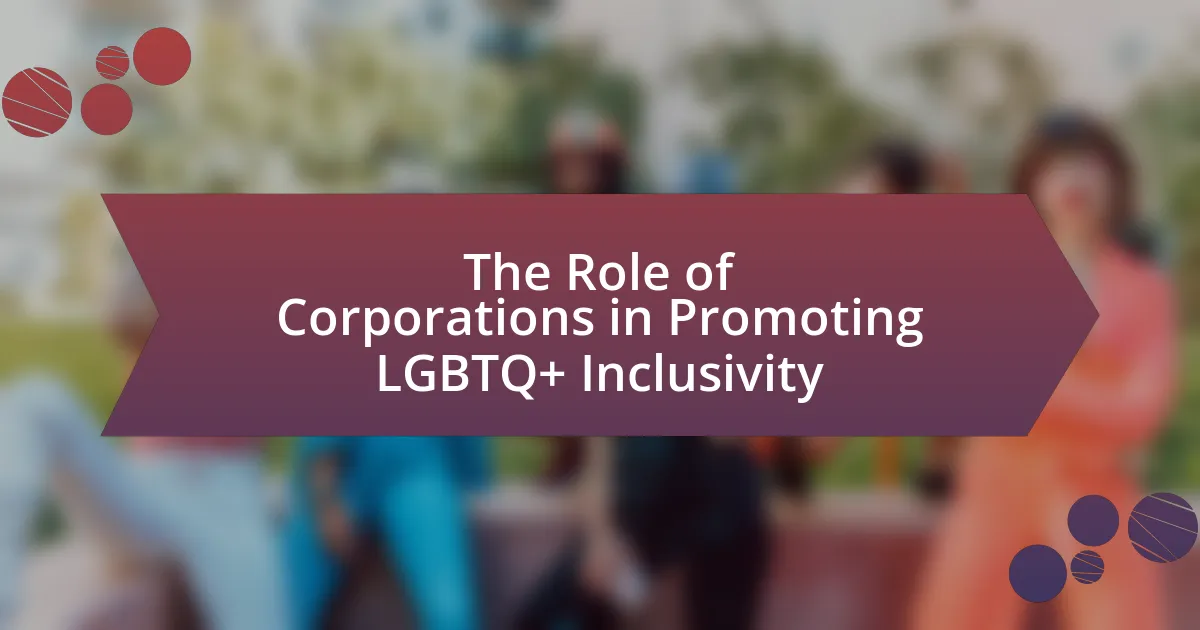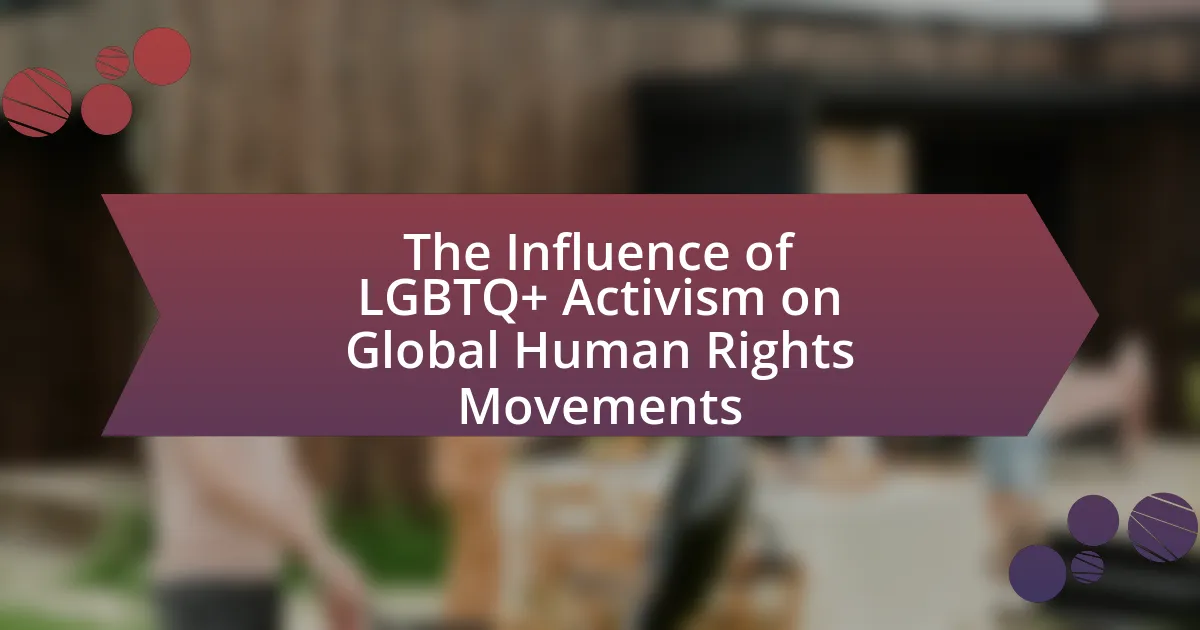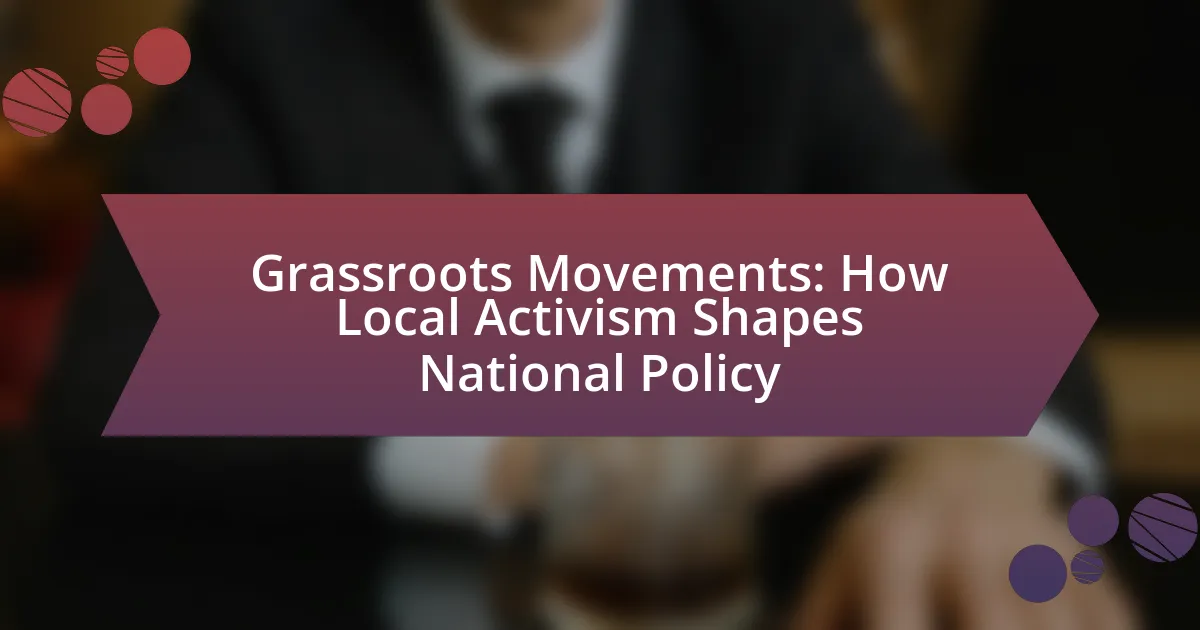The article examines the impact of legislation on LGBTQ+ rights across various countries, highlighting how legal frameworks can either advance or restrict these rights. It discusses the differences in LGBTQ+ rights legislation, with progressive nations like Canada and the Netherlands providing comprehensive protections, while countries such as Uganda and Russia impose severe restrictions and criminalization. Key legislative milestones, the influence of public opinion, and the role of international human rights standards are analyzed, along with the challenges faced by countries with restrictive laws. The article emphasizes the importance of understanding these legislative impacts for advocacy and the promotion of equitable rights for LGBTQ+ individuals globally.

What is the Impact of Legislation on LGBTQ+ Rights Across Different Countries?
Legislation significantly impacts LGBTQ+ rights across different countries by either advancing or restricting those rights. For instance, countries like Canada and the Netherlands have enacted comprehensive anti-discrimination laws and legalized same-sex marriage, leading to greater social acceptance and legal protections for LGBTQ+ individuals. Conversely, nations such as Uganda and Russia have implemented laws that criminalize homosexuality and promote discrimination, resulting in increased violence and social stigma against LGBTQ+ communities. According to the International Lesbian, Gay, Bisexual, Trans and Intersex Association (ILGA), as of 2021, 69 countries still criminalize same-sex relationships, illustrating the stark contrast in legal environments and their effects on LGBTQ+ rights globally.
How does legislation shape LGBTQ+ rights globally?
Legislation shapes LGBTQ+ rights globally by establishing legal frameworks that either protect or restrict the rights of LGBTQ+ individuals. For instance, countries like Canada and the Netherlands have enacted laws that legalize same-sex marriage and prohibit discrimination based on sexual orientation, leading to greater societal acceptance and legal recognition of LGBTQ+ rights. Conversely, nations such as Uganda and Russia have implemented laws that criminalize homosexuality and promote anti-LGBTQ+ sentiments, resulting in increased violence and discrimination against LGBTQ+ individuals. The existence of comprehensive anti-discrimination laws and marriage equality correlates with improved mental health outcomes and social integration for LGBTQ+ communities, as evidenced by studies from the Williams Institute, which highlight the positive impact of legal protections on LGBTQ+ individuals’ well-being.
What are the key legislative milestones affecting LGBTQ+ rights?
Key legislative milestones affecting LGBTQ+ rights include the decriminalization of homosexuality, the legalization of same-sex marriage, and the implementation of anti-discrimination laws. For instance, the U.S. Supreme Court’s decision in Obergefell v. Hodges in 2015 legalized same-sex marriage nationwide, marking a significant advancement in LGBTQ+ rights. Additionally, the repeal of “Don’t Ask, Don’t Tell” in 2011 allowed LGBTQ+ individuals to serve openly in the military, further promoting equality. In many countries, the introduction of comprehensive anti-discrimination laws, such as the Equality Act in the UK in 2010, has provided legal protections against discrimination based on sexual orientation and gender identity. These milestones collectively represent critical progress in the recognition and protection of LGBTQ+ rights globally.
How do different legal frameworks influence LGBTQ+ rights?
Different legal frameworks significantly influence LGBTQ+ rights by establishing the protections, recognitions, and freedoms afforded to LGBTQ+ individuals. For instance, countries with comprehensive anti-discrimination laws, such as Canada and the Netherlands, provide legal protections against discrimination based on sexual orientation and gender identity, leading to greater social acceptance and equality. In contrast, nations with restrictive laws, like Russia and many Middle Eastern countries, often criminalize LGBTQ+ identities, resulting in widespread discrimination, violence, and social stigma. The presence or absence of marriage equality also illustrates this influence; countries that recognize same-sex marriage, such as Germany and Australia, tend to have more robust protections for LGBTQ+ rights compared to those that do not. Thus, the legal framework directly shapes the lived experiences of LGBTQ+ individuals, impacting their rights and societal acceptance.
Why is understanding the impact of legislation on LGBTQ+ rights important?
Understanding the impact of legislation on LGBTQ+ rights is crucial because it directly influences the legal protections and social acceptance of LGBTQ+ individuals. Legislation shapes the framework within which LGBTQ+ people can access rights such as marriage, adoption, and protection from discrimination. For instance, countries that have enacted comprehensive anti-discrimination laws, like Canada, show significant improvements in LGBTQ+ individuals’ mental health and societal integration, as evidenced by studies indicating lower rates of suicide and higher levels of community acceptance. Conversely, nations with restrictive laws, such as those criminalizing same-sex relationships, often experience higher levels of violence and discrimination against LGBTQ+ individuals, leading to adverse social outcomes. Thus, understanding these legislative impacts is essential for advocating for equitable rights and fostering inclusive societies.
What role does public opinion play in shaping LGBTQ+ legislation?
Public opinion significantly influences the development and enactment of LGBTQ+ legislation. When a majority of the population supports LGBTQ+ rights, lawmakers are more likely to introduce and pass legislation that protects these rights, as seen in countries like the United States, where public support for same-sex marriage rose from 27% in 1996 to 67% in 2021, leading to the Supreme Court’s decision in Obergefell v. Hodges in 2015. Conversely, negative public sentiment can hinder progress, as evidenced in countries where anti-LGBTQ+ attitudes prevail, resulting in the enactment of discriminatory laws. Thus, public opinion acts as a barometer for legislative action regarding LGBTQ+ rights, shaping the legal landscape based on societal attitudes.
How do international human rights standards affect national legislation?
International human rights standards significantly influence national legislation by establishing benchmarks for the protection of individual rights, including those of LGBTQ+ individuals. Countries that ratify international treaties, such as the International Covenant on Civil and Political Rights, are often compelled to align their domestic laws with these standards to fulfill their international obligations. For instance, the adoption of anti-discrimination laws in various nations can be traced back to commitments made under international human rights frameworks, which advocate for equality and non-discrimination based on sexual orientation and gender identity. This alignment not only enhances the legal protections available to LGBTQ+ individuals but also promotes societal acceptance and recognition of their rights, as seen in countries that have enacted marriage equality following international pressure and guidance.

What are the variations in LGBTQ+ rights legislation across different countries?
LGBTQ+ rights legislation varies significantly across countries, with some nations offering comprehensive protections while others impose severe restrictions or criminalization. For example, countries like Canada and the Netherlands have legalized same-sex marriage and enacted anti-discrimination laws, providing robust legal frameworks for LGBTQ+ rights. In contrast, nations such as Saudi Arabia and Uganda have laws that criminalize same-sex relationships, leading to severe penalties, including imprisonment or even death. According to the International Lesbian, Gay, Bisexual, Trans and Intersex Association (ILGA), as of 2021, 69 countries still criminalize same-sex relationships, highlighting the stark differences in legal recognition and protection for LGBTQ+ individuals globally.
Which countries have progressive LGBTQ+ rights laws?
Countries with progressive LGBTQ+ rights laws include Canada, the Netherlands, Sweden, and Spain. Canada legalized same-sex marriage in 2005, becoming one of the first countries to do so. The Netherlands was the first country to legalize same-sex marriage in 2001. Sweden has comprehensive anti-discrimination laws and recognizes same-sex marriage since 2009. Spain legalized same-sex marriage in 2005 and has strong protections for LGBTQ+ individuals. These countries exemplify progressive legislation that supports LGBTQ+ rights and equality.
What specific rights are granted in these progressive countries?
Progressive countries grant specific rights to LGBTQ+ individuals, including marriage equality, anti-discrimination protections, and the right to adopt children. For instance, countries like Canada and the Netherlands have legalized same-sex marriage, ensuring legal recognition and benefits for same-sex couples. Additionally, many progressive nations have enacted laws that prohibit discrimination based on sexual orientation and gender identity in employment, housing, and public services, as seen in countries like Sweden and Germany. Furthermore, adoption rights for same-sex couples are recognized in numerous progressive jurisdictions, allowing them to legally adopt children, which is evident in countries such as Spain and Australia. These rights reflect a commitment to equality and protection for LGBTQ+ individuals, supported by legal frameworks and societal acceptance.
How do these rights compare to those in less progressive countries?
LGBTQ+ rights in progressive countries are significantly more advanced compared to those in less progressive countries, where legal protections and societal acceptance are often minimal or non-existent. For instance, in countries like Canada and the Netherlands, same-sex marriage is legal, anti-discrimination laws are in place, and LGBTQ+ individuals enjoy broad civil rights protections. In contrast, many less progressive countries, such as Uganda and Saudi Arabia, have laws that criminalize same-sex relationships, leading to severe penalties, including imprisonment or even death. According to the International Lesbian, Gay, Bisexual, Trans and Intersex Association (ILGA), as of 2021, 69 countries still criminalize same-sex relationships, highlighting the stark disparity in legal recognition and protection of LGBTQ+ rights globally.
What are the challenges faced by countries with restrictive LGBTQ+ laws?
Countries with restrictive LGBTQ+ laws face significant challenges, including human rights violations, social stigma, and economic repercussions. These laws often lead to systemic discrimination, resulting in violence against LGBTQ+ individuals and limiting their access to healthcare, education, and employment opportunities. For instance, according to a 2021 report by the International Lesbian, Gay, Bisexual, Trans and Intersex Association (ILGA), countries with anti-LGBTQ+ legislation experience higher rates of mental health issues among LGBTQ+ populations due to societal rejection and fear of persecution. Additionally, restrictive laws can deter foreign investment and tourism, as businesses and travelers often avoid regions perceived as unsafe or discriminatory, impacting economic growth.
How do cultural attitudes impact the enforcement of LGBTQ+ rights?
Cultural attitudes significantly influence the enforcement of LGBTQ+ rights by shaping public opinion, legislative priorities, and judicial interpretations. In countries where cultural norms are predominantly conservative, such as in many parts of Africa and the Middle East, there is often a lack of legal protections for LGBTQ+ individuals, leading to widespread discrimination and violence. For instance, in Uganda, the Anti-Homosexuality Act reflects societal attitudes that view homosexuality as immoral, resulting in harsh penalties and a hostile environment for LGBTQ+ individuals. Conversely, in nations like Canada and the Netherlands, where cultural attitudes are more accepting, there are robust legal frameworks that protect LGBTQ+ rights, including marriage equality and anti-discrimination laws. This correlation between cultural attitudes and legal enforcement is evident in the Global Acceptance Index, which shows that countries with higher acceptance rates tend to have more comprehensive protections for LGBTQ+ individuals.
What legal barriers exist for LGBTQ+ individuals in these countries?
Legal barriers for LGBTQ+ individuals in various countries include criminalization of same-sex relationships, lack of anti-discrimination laws, and restrictions on marriage and adoption rights. For instance, in countries like Saudi Arabia and Iran, same-sex sexual activity is punishable by severe penalties, including imprisonment or even death. Additionally, many nations lack comprehensive legal protections against discrimination based on sexual orientation or gender identity, which can lead to systemic inequality in employment, housing, and healthcare. Furthermore, in several regions, same-sex couples are denied the right to marry or adopt children, reinforcing social stigmas and limiting family rights. These legal frameworks significantly hinder the rights and freedoms of LGBTQ+ individuals, perpetuating a cycle of discrimination and marginalization.

How do recent legislative changes affect LGBTQ+ communities?
Recent legislative changes significantly impact LGBTQ+ communities by either advancing or restricting their rights and protections. For instance, in the United States, the repeal of certain protections under the Equality Act has led to increased discrimination against LGBTQ+ individuals, particularly in areas such as employment and healthcare. Conversely, countries like Germany have enacted laws that enhance rights for transgender individuals, allowing for easier legal gender recognition. These legislative shifts directly influence the social and economic well-being of LGBTQ+ individuals, as evidenced by studies showing that legal protections correlate with lower rates of mental health issues and higher levels of community acceptance.
What recent laws have been enacted that impact LGBTQ+ rights?
Recent laws that have been enacted impacting LGBTQ+ rights include the Respect for Marriage Act in the United States, which was signed into law in December 2022, ensuring federal recognition of same-sex marriages. Additionally, countries like Germany have implemented laws allowing for gender self-identification, which came into effect in 2023, enhancing the rights of transgender individuals. In 2023, the United Kingdom introduced the Gender Recognition Act reform, aimed at simplifying the process for transgender individuals to obtain legal recognition of their gender. These legislative changes reflect a growing trend towards the protection and recognition of LGBTQ+ rights globally.
How do these laws affect the daily lives of LGBTQ+ individuals?
Laws significantly affect the daily lives of LGBTQ+ individuals by determining their rights and protections against discrimination. For instance, in countries with anti-discrimination laws, LGBTQ+ individuals experience greater workplace security and access to healthcare, which enhances their overall quality of life. Conversely, in regions lacking such protections, LGBTQ+ individuals often face harassment, job insecurity, and limited access to essential services. According to a 2021 report by the International Lesbian, Gay, Bisexual, Trans and Intersex Association (ILGA), countries with comprehensive legal protections for LGBTQ+ rights report lower rates of mental health issues among these populations, highlighting the direct impact of legislation on their well-being.
What are the implications of these laws for LGBTQ+ advocacy groups?
The implications of these laws for LGBTQ+ advocacy groups include increased challenges in promoting equality and protecting rights. Legislative measures that restrict LGBTQ+ rights often lead to heightened discrimination and social stigma, making it more difficult for advocacy groups to operate effectively. For instance, in countries where anti-LGBTQ+ laws are enacted, advocacy groups may face legal repercussions, limiting their ability to organize, fundraise, and mobilize support. Additionally, these laws can deter potential allies and donors, as they may be reluctant to associate with organizations operating in hostile environments. The Human Rights Campaign reported that in 2021, over 100 anti-LGBTQ+ bills were introduced in the United States alone, illustrating the growing legislative obstacles that advocacy groups must navigate.
What can be learned from the experiences of different countries?
Different countries’ experiences reveal that legislation significantly influences LGBTQ+ rights and societal acceptance. For instance, countries like Canada and the Netherlands, which have implemented comprehensive anti-discrimination laws and legalized same-sex marriage, demonstrate higher levels of societal acceptance and lower rates of hate crimes against LGBTQ+ individuals. In contrast, nations with restrictive laws, such as Uganda and Russia, exhibit widespread discrimination and violence against LGBTQ+ communities, highlighting the direct correlation between legal frameworks and the safety and rights of these individuals. This evidence underscores the importance of progressive legislation in fostering an inclusive society.
How can successful legislative strategies be replicated in other nations?
Successful legislative strategies can be replicated in other nations by adapting proven frameworks to local contexts. For instance, countries that have successfully advanced LGBTQ+ rights, such as Canada and the Netherlands, utilized comprehensive public education campaigns, coalition-building among diverse stakeholders, and evidence-based policy development. These strategies can be tailored to fit the cultural, social, and political landscapes of other nations, ensuring that they resonate with local populations. Research indicates that countries with strong civil society engagement and inclusive dialogue tend to achieve more effective legislative outcomes, as seen in the Global Acceptance Index, which correlates public support with legislative progress.
What lessons can be drawn from countries that have reversed LGBTQ+ rights?
Countries that have reversed LGBTQ+ rights demonstrate that political and social backlash can significantly undermine previously established protections. For instance, in Hungary, the government enacted legislation in 2020 that effectively banned the legal recognition of transgender individuals, reflecting a broader trend of populist governments targeting LGBTQ+ rights. This illustrates that shifts in political power can lead to the erosion of civil liberties, emphasizing the need for robust legal frameworks and international support to safeguard these rights. Furthermore, the experiences of nations like Poland, where local governments declared “LGBT-free zones,” highlight the importance of community mobilization and advocacy in countering discriminatory policies. These examples underscore the necessity for vigilance and proactive measures to protect LGBTQ+ rights in the face of potential reversals.
What practical steps can advocates take to influence legislation for LGBTQ+ rights?
Advocates can influence legislation for LGBTQ+ rights by engaging in grassroots organizing, lobbying lawmakers, and raising public awareness. Grassroots organizing involves mobilizing community members to participate in campaigns that highlight LGBTQ+ issues, which can create a strong base of support. Lobbying lawmakers includes meeting with elected officials to discuss the importance of LGBTQ+ rights and providing them with data and personal stories that illustrate the need for legislative change. Raising public awareness through media campaigns and educational initiatives can shift public opinion and pressure legislators to act. For instance, the Human Rights Campaign reported that increased visibility of LGBTQ+ issues in media correlates with greater public support for related legislation.
